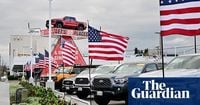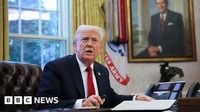In a bold move that has sent ripples through the automotive industry, President Donald Trump has announced a new set of 25% tariffs on foreign-made vehicles and auto parts, set to take effect on April 2, 2025. This decision has sparked a flurry of reactions from both consumers and industry experts, raising concerns about potential price hikes and the impact on American manufacturing.
During an interview with NBC News on March 29, 2025, Trump expressed his indifference to the prospect of rising car prices, stating he "couldn't care less" if automakers raised their prices in response to the tariffs. "If the prices on foreign cars go up, they’re going to buy American cars," he asserted, emphasizing his belief that consumers would turn to domestically manufactured vehicles as a result.
As the tariffs loom, many consumers are feeling the pressure to make purchases before the prices increase. Edgar Cruz, a Fremont resident, decided to buy a Subaru WRX on March 30, 2025, because he anticipated that the 25% tariff on vehicles imported from Japan would raise the price of his dream car by more than $9,000. "The plan was exactly to get it in two months. Because of the tariffs, I had to decide to get it today. That was the main driver for my decision," Cruz explained, highlighting how the impending tariffs influenced his buying timeline.
Gino Ventanilla, a finance manager at Premier Subaru of Fremont, noted a significant uptick in dealership foot traffic over the weekend, as customers rushed to secure their purchases before the tariffs took effect. "They might be shopping for a few months. And those timelines have kind of been sped up a little bit," he remarked, indicating that the urgency created by the tariffs is driving serious buyers to finalize their decisions sooner than expected.
The tariffs are expected to have a broad impact across the auto industry. According to the National Highway Traffic Safety Administration, even major American manufacturers like Ford and General Motors, which source parts from Canada and Mexico, will face increased costs. A study by the Yale Budget Lab forecasted that the tariffs could lead to an average price increase of 13.5% on new cars, translating to an additional $6,400 on the average new 2024 vehicle.
Trump's senior counselor for trade and manufacturing, Peter Navarro, urged Americans to trust in the president's approach, arguing that previous tariffs on China had resulted in "prosperity and price stability." He claimed that the burden of the tariffs would largely fall on foreign manufacturers, saying, "The reason why we will not see inflation is because foreigners are going to eat most of it, they have to." Despite these assurances, a CBS News poll conducted around the same time revealed that 72% of consumers were concerned about potential price increases due to the tariffs.
Shawn Fain, president of the United Auto Workers union, acknowledged the tariffs as a necessary "tool in the toolbox" for returning manufacturing jobs to the U.S. However, he cautioned that while tariffs might motivate companies to bring jobs back, they are not a complete solution for American workers. "If jobs are being brought back to the United States, they need to be good paying union jobs that set standards," he stated on CBS's "Face the Nation" on March 30, 2025.
As the tariffs approach, the international response has been swift. Leaders from various countries, including the UK, Germany, and Canada, have voiced their concerns and threatened retaliation. Downing Street sources indicated that the UK would not hesitate to respond to U.S. tariffs, while Germany's government stated it "will not give in" and that Europe must "respond firmly". French President Emmanuel Macron characterized the tariffs as "a waste of time" and "incoherent", and Canada labeled them a "direct attack" on their trade relationship.
Trump's focus on tariffs has also drawn criticism from within his own party. Senator Rand Paul expressed his disagreement with the president's approach, stating, "International trade since [the Second World War] has made us phenomenally rich. The more we trade … the less we fight." This sentiment reflects a growing concern that the tariffs could lead to a trade war, further complicating the already tense relationships with major trading partners.
In addition to the tariffs on vehicles, Trump has also threatened to impose secondary tariffs of 25-50% on Russian oil if he perceives that President Vladimir Putin is stalling progress on peace talks regarding Ukraine. During another interview, Trump stated, "If I think it was Russia's fault, I am going to put secondary tariffs on oil, on all oil coming out of Russia," indicating that his tariff strategy extends beyond the automotive sector.
As the automotive industry braces for the impact of these tariffs, many consumers are already feeling the urgency to make purchases before prices rise. Jim Fussell, who witnessed his wife purchase a Subaru after a year of research, noted, "We're very happy. This will be our second Subaru that we've owned," signaling a sense of relief among buyers who are navigating the uncertain landscape of car prices.
Experts predict that the ripple effects of the tariffs may extend beyond new cars, with used car prices also expected to climb due to shifts in supply and demand. As the market adjusts to these changes, consumers and industry stakeholders alike will be watching closely to see how the situation unfolds.
In summary, Trump's new tariffs on foreign-made vehicles are set to reshape the automotive landscape in the U.S., prompting consumers to act quickly while raising concerns about price increases and international relations. The coming days will be crucial as the tariffs take effect and the full extent of their impact becomes clear.







